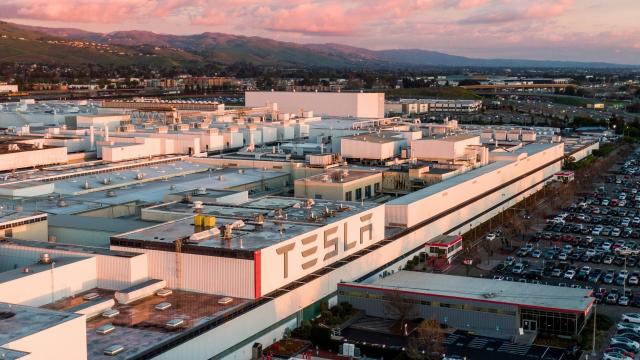The Environmental Protection Agency has fined Tesla a paltry $US275,000 ($381,755) for repeated Clean Air Act violations — chump change for the $US800 ($1,111) billion electric vehicle company heralded as an environmental champion. I love a little irony in the morning!
In a release issued Tuesday, the EPA said that Tesla’s Fremont, California, factory had violated several portions of the Clean Air Act that control the amount of emissions companies can release from painting and coating cars and trucks. According to the EPA, from 2016 through 2019, the facility had several lapses that led to it not sticking to these standards, including failing to develop a work plan for minimising emissions and not keeping adequate records.
The company’s car coating includes some chemicals that have links to serious health effects like cancer, including formaldehyde, ethylbenzene, naphthalene, and xylene. These chemicals are on the EPA’s official list of hazardous pollutants that need to be regulated at industrial facilities in order to keep them from harming workers and people living near factories.
Tesla, the EPA said, “has corrected the violations noted in both settlements and returned to compliance.” The company reported $US2.3 ($3) billion in income last year, so I can’t imagine it will have any trouble coming up with $US275,000 ($381,755) for that pesky fine.
The problems that the EPA’s fine covers at the factory have been well-reported. While paint shop fires are relatively rare occurrences in manufacturing, fires were endemic at the Fremont during the time period the EPA’s fine covers. At least five paint shop fires happened at the Fremont factory between 2014 and 2018, including one that shut down Model 3 production for a week. In 2018, Tesla employees working in the paint shop told CNBC that poor maintenance, training, and cleaning were responsible for the fires, and that CEO Elon Musk and other high-level executives had encouraged them to keep working to make Model 3s rather than suspending production to implement larger fixes. Some paint shop employees expressed concerns about their health to CNBC.
Some of this mismanagement may be baked into how the company is designed, especially in its rush to hit Model 3. In 2018, Tesla, along with Amazon, topped a list of the U.S.’s most dangerous places to work, thanks in part to the inordinate amount of injuries at the Fremont factory. An investigation into working conditions at the factory by news outlet Reveal in 2018 found that workers overwhelmingly said that Musk doesn’t like the aesthetics of a lot of common safety markers in factories — like the colour yellow, or excessive signage — meaning that the Fremont factory lacked those qualities. (Tesla has denied this claim.)
“If someone said, ‘Elon doesn’t like something,’ you were concerned because you could lose your job,” Susan Rigmaiden, Tesla’s former environmental compliance manager, told Reveal in 2018.
Some of the issues at Fremont have been addressed in previous environmental fines. In 2019, the EPA slapped Tesla with a $US31,000 ($43,034) penalty and ordered it to spend an additional $US55,000 ($76,351) on emergency response equipment following inspections that found that the Fremont facility wasn’t properly disposing of toxic waste. Tesla has also faced penalties for a smattering of offences since 2010, including paying $US71,000 ($98,562) in 2013 after workers were sprayed with aluminium.
But it’s difficult to assume that a measly $US275,000 ($381,755) will transform a company that has time and again prioritised executive input and the bottom line over worker safety and environmental protections — and yet has profited off its image as a company working to change the clean energy future. In 2020, the Fremont factory repeatedly put workers at risk by forcing them to come into the factory to work at the height of the covid-19 pandemic, leading to an outbreak of cases at the facility, according to Alameda County data. Regardless, Musk sued the county over its policies, and the company ultimately bullied the county into changing safety rules so workers could continue to come into the factory to work. A couple of months later, Tesla’s annual report called covid lockdowns an “unprecedented opportunity to learn from this disruption and accelerate the deployment of clean energy solutions.”
It sounds like Tesla may have fixed some of its air pollution problems, but these fines are a great reminder that just because a company may position itself as a clean energy leader doesn’t mean there isn’t some dirt just beneath the shiny surface.
